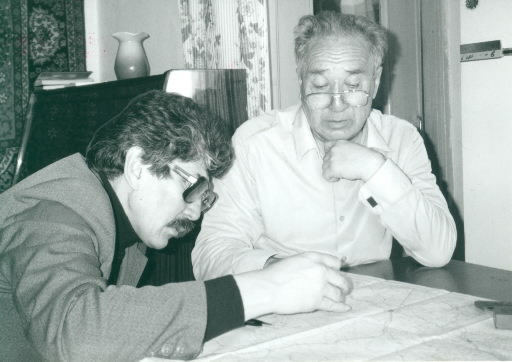2. The Hydrogen-bomb Tests
Jan. 18, 2013
Chapter 2: Soviet Union
Part 1: The Largest Nuclear Test Site in the Nation
Part 1: The Largest Nuclear Test Site in the Nation
We were restricted in our movements to within the area around Semipalatinsk, and thus being unable to get close to the test site itself, had to be content with using the few days we had to interview those willing to talk to us about the testing. Among those we interviewed was Toryuval Ichenov, a former government official now retired and sharing an apartment with his son's family.
In June 1949, before the first atomic test scheduled to take place that August, Ichenov was ordered to close and evacuate farms near the test site. He traveled from village to village over the next five years, getting busier as the frequency of the tests increased. In 1953, while visiting a small farm thirty-five miles east of the test site, he witnessed an unforgettable sight: the explosion of the Soviet Union's first hydrogen bomb.
"It was August 12, at a village called Krasnoyulta. Just before eleven there was a flash, then I saw a huge mass forming on the horizon, black at first, then changing to the color of red earth. After about three minutes there was a roar, and a gigantic cloud of dust blew over. I covered my mouth and threw myself on the ground. When I eventually got up I found that the blast of wind had damaged some of the nearby buildings—I was so stunned."
Throughout our discussion Ichenov glanced frequently at Urazalin, who had accompanied us, for reassurance that it was safe to discuss such matters. Urazalin encouraged him to say whatever he liked, reiterating to him that this was the era of glasnost, but it looked as if even Urazalin was shocked at the gravity of Ichenov's revelations.
Leonid Leznikov, a journalist for the Kazakhstan Pravda, was also a witness to the first hydrogen-bomb test. He was eight years old when he watched the mushroom cloud from his home in Semipalatinsk, 110 miles to the east of the test site.
"It was like a painting in black and red, and seemed less like a cloud than a strange creature with a life of its own," he told us. "Almost all the windows facing west were blown in by the blast, and radio broadcasts advised people to leave their houses."
Ichenov's job became much simpler after the hydrogen bomb test, as the farmers were too frightened to resist evacuation. The number of farms evacuated rose to eight, including some situated at the foot of Mt. Degelin, which was within the testing site. Most of the farms evacuated were located to the south of the site.
"The army told us they would only carry out tests when the wind was blowing from north to south, which makes me think now that they were aware of the danger of radiation," he remarked, gesturing toward his map. However, the army did not take the wind into consideration every time they carried out a test. A super hydrogen bomb was exploded in November 1955 when the wind was blowing from west to east--in other words toward Semipalatinsk.
The day of the blast is indelibly etched on the memories of the people of the city. Over thirty years later they are still talking about all the windows shattered by the blast, being temporarily deafened by wind pressure, fireplaces fanned into ferocious blazes, people badly injured by glass falling from high-rise buildings, the dirty rain that fell afterward, and the collapse of old wooden homes. The shock waves from the explosion wreaked havoc as far away as the city of Ust-Kamenogorsk, three hundred miles to the east, shattering all the windows that lay in its path.
The citizens of Semipalatinsk were able to speak at length about the material destruction wrought by the tests; however, when questioned about changes in the radiation level or their health directly after the blast, they made almost no comment. Little wonder that this should be the case; there was not a single instrument for measuring radiation in this city of 360,000, and nobody knew anything about the effects of exposure to radiation. Not only that, witnesses to the blast were forbidden to tell anyone that they had even seen it, let alone the extent of the destruction. To preserve secrecy, a KGB security net was thrown up around the city. The people had no choice but to keep quiet.








